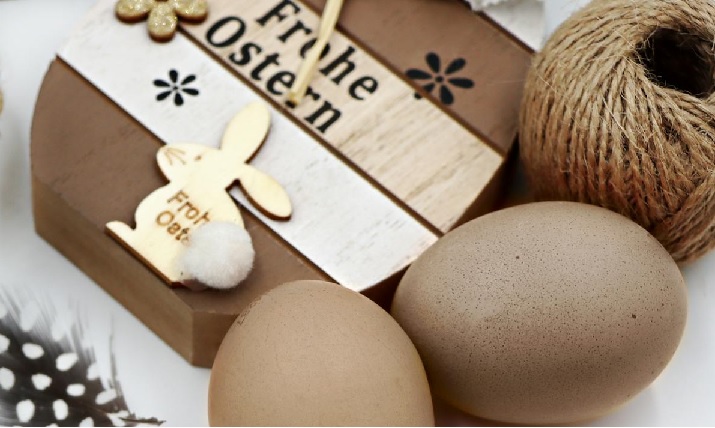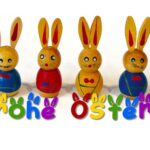
Easter is one of the most important holidays in Germany, and just like Christmas or New Year’s, it comes with special greetings and traditions. Whether you’re sending a greeting card, visiting German-speaking family, or simply learning the language, knowing how to say Happy Easter in German adds a cultural touch to your celebrations.
While “Frohe Ostern!” is the most common phrase, there are several other regional and formal ways to wish someone a joyful Easter holiday. In this guide, we’ll explore the meanings behind German Easter greetings, when and how to use them, and how Easter wishes are exchanged in Germany.
The Most Common German Easter Greeting: Frohe Ostern!
If you only learn one Easter greeting, make it this:
“Frohe Ostern!” – The Classic Easter Greeting
- Pronunciation: [FROH-uh OST-ern]
- Meaning: “Happy Easter!”
- When to Use: This is the most widely used Easter greeting in Germany, suitable for friends, family, and colleagues.
- Variations: Some people say “Frohes Osterfest!”, meaning “Happy Easter Festival!”
Read more: The Meaning of Ostern: Why Easter Is One of Germany’s Most Important Holidays
Alternative German Easter Greetings
Besides “Frohe Ostern,” there are several other phrases used to wish someone a happy Easter.
1. “Gesegnete Ostern!” – A Religious Easter Wish
- Pronunciation: [guh-ZEG-nuh-tuh OST-ern]
- Meaning: “Blessed Easter!”
- When to Use: Used by religious communities and in church settings.
2. “Schöne Ostertage!” – Wishing Someone a Nice Easter Holiday
- Pronunciation: [SHUH-nuh OST-er-tah-guh]
- Meaning: “Have a lovely Easter weekend!”
- When to Use: A casual and polite greeting, often used in written Easter cards.
3. “Frohe und gesegnete Ostern!” – A Formal Easter Greeting
- Pronunciation: [FROH-uh oont guh-ZEG-nuh-tuh OST-ern]
- Meaning: “Happy and Blessed Easter!”
- When to Use: A formal and elegant greeting, often used in official holiday wishes.
Read more: Easter Sunday vs. Easter Monday in Germany: Why Germans Get Two Holidays
How Do Germans Exchange Easter Greetings?
In Germany, Easter greetings are exchanged in several ways, from spoken wishes to greeting cards and emails.
1. Wishing Friends and Family “Frohe Ostern” in Person
- Easter greetings are commonly exchanged when visiting family for Easter brunch or dinner.
- Many people say “Frohe Ostern!” when giving Easter gifts or chocolate eggs.
2. Sending Easter Cards (Osterkarten)
- Germans love sending holiday greeting cards, and Easter is no exception.
- Easter cards often include traditional greetings, religious blessings, and spring imagery.
3. Easter Greetings in Emails and Texts
- Businesses and workplaces often send out Easter greeting emails with a formal phrase like “Wir wünschen Ihnen frohe Ostern!” (We wish you a happy Easter!).
- Families and friends exchange text messages with short Easter wishes.
Read more: Easter Egg Hunts in Germany: A Family Tradition with a Long History
Easter Proverbs and Sayings in German
Germany has several traditional Easter-related proverbs and phrases that reflect the spirit of the season.
1. “Wenn der Hase Eier legt, ist Ostern nicht mehr weit.”
- Translation: “When the rabbit lays eggs, Easter is not far away.”
- Meaning: A humorous way to say that Easter is coming soon.
2. “Ostern ist das Fest der Hoffnung und der Freude.”
- Translation: “Easter is the festival of hope and joy.”
- Meaning: A classic phrase used in church sermons and Easter speeches.
3. “Nach Ostern ist vor Pfingsten.”
- Translation: “After Easter comes Pentecost.”
- Meaning: This phrase reminds people that another Christian holiday is on the way.
Read more: The Symbolism of Easter Fires (Osterfeuer) in Germany
Easter Greetings in German-Speaking Countries
Not all German-speaking countries use the same Easter greetings. Here’s how Easter is wished in different regions:
1. Austria
- Austrians also say “Frohe Ostern”, but in rural areas, you might hear “Frohes Osterfest!”
- Easter greetings are often accompanied by a small gift or decorated egg.
2. Switzerland
- Swiss Germans use “Schöne Ostertage!” more commonly than “Frohe Ostern!”.
- Easter in Switzerland is often associated with spring festivals and chocolate gifts.
Read more: German Easter Foods: What’s on the Table During Ostern?
How to Respond to Easter Greetings in German
When someone wishes you “Frohe Ostern!”, here are a few ways to respond:
- “Danke, dir auch!” – “Thanks, you too!” (Informal)
- “Vielen Dank, Ihnen auch frohe Ostern!” – “Thank you very much, happy Easter to you too!” (Formal)
- “Gleichfalls!” – “Same to you!”
How to Incorporate German Easter Greetings into Your Celebration
Want to add a German touch to your Easter celebration? Here’s how:
- Write Easter cards in German, even if it’s just a simple “Frohe Ostern”.
- Teach your children Easter greetings in German, along with Easter songs.
- Use traditional German phrases in your Easter emails or messages to friends.
- Create Easter decorations featuring German Easter quotes and greetings.
Read more: Why Do Germans Eat Green Food on Maundy Thursday? (Gründonnerstag Tradition)
Now you know how to say Happy Easter in German, whether you’re speaking to friends, family, or colleagues. From Frohe Ostern to Gesegnete Ostern, these phrases will help you share Easter joy in a truly German way.
Want to Learn More About German Easter?
German Easter Songs and Poems: The Music and Poetry of Ostern
The Meaning of Ostern: Why Easter Is One of Germany’s Most Important Holidays
The Fascinating Story Behind the German Easter Bunny (Osterhase)
Related recipes:
Hefezopf Recipe – Traditional German Sweet Braided Bread
Authentic Osterkranz Recipe – German Easter Wreath Bread
Osterzopf – Traditional German Easter Braided Bread Recipe







